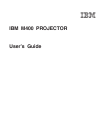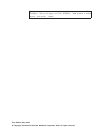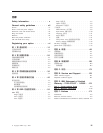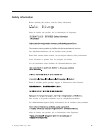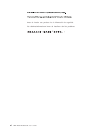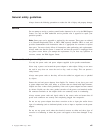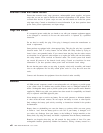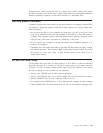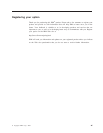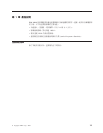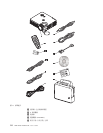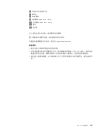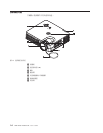
discharged state could increase the risk of a battery short circuit, which could shorten
the life of the battery and can also pose a safety hazard. Do not let rechargeable Lithium-Ion
batteries completely discharge or store these batteries in a discharged state.
Heat and product ventilation
Computers generate heat when turned on and when batteries are charging. Notebook PCs
can generate a significant amount of heat due to their compact size. Always follow these
basic precautions:
v Do not leave the base of your computer in contact with your lap or any part of your
body for an extended period when the computer is functioning or when the battery is
charging. Your computer produces some heat during normal operation. Extended contact
with the body could cause discomfort or, potentially, a skin burn.
v Do not operate your computer or charge the battery near flammable materials or in
explosive environments.
v Ventilation slots, fans and/or heat sinks are provided with the product for safety, comfort,
and reliable operation. These features might inadvertently become blocked by placing
the product on a bed, sofa, carpet, or other flexible surface. Never block, cover or
disable these features.
CD and DVD drive safety
CD and DVD drives spin discs at a high speed. If a CD or DVD is cracked or otherwise
physically damaged, it is possible for the disc to break apart or even shatter when the
CD drive is in use. To protect against possible injury due to this situation, and to reduce
the risk of damage to your machine, do the following:
v Always store CD/DVD discs in their original packaging
v Always store CD/DVD discs out of direct sunlight and away from direct heat sources
v Remove CD/DVD discs from the computer when not in use
v Do not bend or flex CD/DVD discs, or force them into the computer or their packaging
v Check CD/DVD discs for cracks before each use. Do not use cracked or damaged discs
General safety guidelines ix



